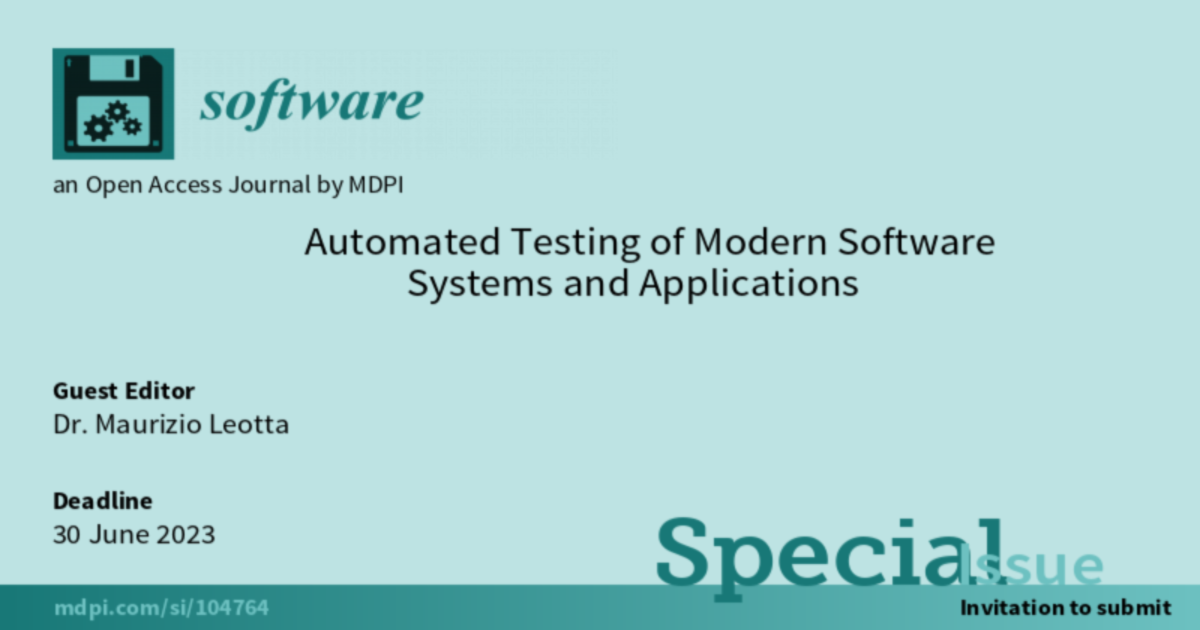Automated Testing of Modern Software Systems and Applications
A special issue of Software (ISSN 2674-113X).
Deadline for manuscript submissions: 30 April 2024 | Viewed by 1663

Special Issue Editor
Interests: software engineering; software testing; test automation; empirical software engineering; requirements engineering; business process modeling; model-driven software engineering
Special Issue Information
Dear Colleagues,
Modern software systems and applications have a significant impact on all aspects of our society, being crucial for a multitude of economic, social, and educational activities. Indeed, a considerable amount of modern software runs on web browsers and smartphones, while IoT systems are becoming ubiquitous.
As a consequence, assuring the correctness and quality of such systems/applications is of undeniable importance. Their complexity and characteristics, combined with ever-shorter development cycles, demand novel approaches to testing. Several exciting research directions are emerging, ranging from the automated generation of test suites using, for example, search-based strategies, to the usage of machine learning (ML) and artificial intelligence (AI) to further increase the effectiveness of testing frameworks and tools.
Moreover, many cutting-edge modern applications often include ML- and AI-based features, but the quality assurance of these complex, intelligent components is still at a very early stage.
This Special Issue welcomes contributions regarding novel automated testing approaches improving the state-of-the-art on testing modern software with a particular (but not limited) focus on Web, Mobile, IoT, ML/AI-based systems, and applications.
Topics of interest include but are not limited to the following:
- Testing of web applications;
- Testing of mobile applications (e.g., Android, iOS);
- Testing of Internet of Things systems;
- Testing of Machine Learning and Artificial Intelligence-based systems/applications
- Automated generation and maintenance of test cases for modern systems/applications;
- End-to-end testing of web and mobile applications;
- Acceptance and system testing of modern systems/applications;
- Machine Learning and Artificial Intelligence applied to software testing;
- Tools and frameworks for testing modern systems/applications;
- Empirical studies on modern systems/applications testing (e.g., experiments, surveys, literature reviews).
Dr. Maurizio Leotta
Guest Editor
Manuscript Submission Information
Manuscripts should be submitted online at www.mdpi.com by registering and logging in to this website. Once you are registered, click here to go to the submission form. Manuscripts can be submitted until the deadline. All submissions that pass pre-check are peer-reviewed. Accepted papers will be published continuously in the journal (as soon as accepted) and will be listed together on the special issue website. Research articles, review articles as well as short communications are invited. For planned papers, a title and short abstract (about 100 words) can be sent to the Editorial Office for announcement on this website.
Submitted manuscripts should not have been published previously, nor be under consideration for publication elsewhere (except conference proceedings papers). All manuscripts are thoroughly refereed through a single-blind peer-review process. A guide for authors and other relevant information for submission of manuscripts is available on the Instructions for Authors page. Software is an international peer-reviewed open access quarterly journal published by MDPI.
Please visit the Instructions for Authors page before submitting a manuscript. The Article Processing Charge (APC) for publication in this open access journal is 1000 CHF (Swiss Francs). Submitted papers should be well formatted and use good English. Authors may use MDPI's English editing service prior to publication or during author revisions.
Keywords
- software engineering
- software testing
- test automation
- web application
- mobile application
- Internet of Things (IoT)
- machine learning (ML)
- deep learning
- Artificial Intelligence (AI)
- applications of AI and ML
- empirical study



